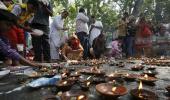
The Supreme Court on Thursday said irrespective of the submissions that Lord Ayyappa of the Sabarimala temple has 'celibate character', it cannot remain 'oblivious' of the fact that the entry of women in the age group of 10-50 was barred on 'physiological ground' of menstruation.
A five-judge Constitution bench headed by Chief Justice Dipak Misra, however, termed as 'impressive' the persuasive and vehement submissions of advocate Sai Deepak, appearing for People for Dharma and NGO Chetna that Lord Ayyapa being a 'juristic person' has the right to preserve his 'brahmacharya' (celibate) character under the Constitution.
"Your (lawyer) arguments are impressive, I must admit that," the CJI observed.
"But, the court can't be oblivious of the fact of the case that a class of women is disallowed due to physiological reasons (menstruation)," the bench, which also comprised justices R F Nariman, A M Khanwilkar, D Y Chandrachud and Indu Malhotra, said.
The bench, which was hearing pleas of Indian Young Lawyers Association and others challenging the ban, asked whether the practice at Sabarimala of barring women of the age group of 10-50 years from entering the temple was an 'essential and integral' practice of a religious denomination.
Justice Chandrachud intervened and said there was no need to even go into the 'essentiality' test and 'the core of issue is whether Constitution overrides all other aspects. If yes, then nobody can exclude a class of women from visiting temple'.
"I go beyond the essentiality test. Essentiality aspect has taken charge of Article 25 (freedom of conscience and free profession, practice and propagation of religion) under the Constitution, but it should not be so. Because of the fact that something is essential to the religion it becomes inviolable," Justice Chandrachud said.
Due to this essentiality doctrine, judges including the Supreme Court judges are now assuming a 'theological mantle' which we are not expected to do, he said.
"The test should be whether a practice subscribes to the Constitution irrespective of whether it is essential or not," Justice Chandrachud said.
At the outset, lawyer Deepak said Lord Ayyappa of the Sabarimala is a 'juristic person' for the purposes of property ownership and taxes and hence, he equally has rights under Article 21 (protection of life and personal liberty), 25 (freedom to practice religion) and 26 (freedom to manage religious affair) of the Constitution.
The deity has the right to remain a 'Naishtika Brahmachari' (eternal celibate) and this was also part of the right to privacy of the deity, the lawyer said, adding that the will of the deity needed to be respected.
The women has been respecting the tradition for a long time now and and 'this is not a case of temple versus women or men versus women'.
The public nature of the temple, which not also funded by the State or its Consolidate Fund of India, did not dilute the separate denominational right of the temple and devotees of Lord Ayyappa, he said.
"Who constitute separate religious denomination," the bench asked. The devotees of Lord Ayyappa, the lawyer replied.
During the day-long hearing, the bench asked whether Article 14 (equality before law) and 15(1) (prohibition of discrimination) would apply in the Sabarimala case as these fundamental rights are enforceable against the State and its instrumentalities.
It further said that rule is part of State action.
The rule was not the state action and it was just a 'codification' of customary religious practices and if the court decides to strike down the rules then it amounts to striking down the 'custom itself', the lawyer said.
The issue of exclusion of women was not based on notion of purity and rather dependent on facts like celibate nature of the deity which has been preserved for years, he said.
The court and others should not be 'superimposing' their social views on the temple which has stated its position 'loud and clear'.
"Tomorrow somebody can say that he would like to offer chicken as 'prasadam'," he said, adding that can such an offer be entertained and the rules of religion and the God cannot be changed.
Individual rights have to be respected and simultaneously, the right and the nature of the deity were also required to be protected.
The bench then said that there was a need to strike a balance between the individual right with the rights of the religious institutions of a particular denomination.
Radhhakrishnan says various kind of morality are in built in Article 25(1) of the Constitution. He says the word morality be prefixed with 'public' i.e., public morality.
Senior advocate K Radhhakrishnan, appearing for the Pandalam royal family, referred to the concept of morality and and said that the constitutional morality cannot override the private morality in cases of religious practices.
"The silent majority has been doing 41 days of 'penance' and they are not being heard this court," he said, adding that the deity is celibate.
Another senior advocate V Giri, appearing for head priest of the temple, also stressed the fact of uniqueness of the deity and said that the celibate character of the deity cannot be challenged by those who wished to pray.
"The belief of the devotee has to be in sync with the belief of the deity and it cannot be the case that you challenge the nature of the deity and want to pray also," he said.
The advancing of the arguments of would continue on Friday.










